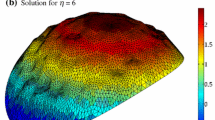Abstract
In this paper, we define a new class of finite elements for the discretization of problems with Dirichlet boundary conditions. In contrast to standard finite elements, the minimal dimension of the approximation space is independent of the domain geometry and this is especially advantageous for problems on domains with complicated micro-structures. For the proposed finite element method we prove the optimal-order approximation (up to logarithmic terms) and convergence estimates valid also in the cases when the exact solution has a reduced regularity due to re-entering corners of the domain boundary. Numerical experiments confirm the theoretical results and show the potential of our proposed method.
Similar content being viewed by others
References
Bank, R.E., Xu, J.: An Algorithm for Coarsening Unstructured Meshes. Numer. Math. 73(1), 1–36 (1996)
Brenner, S., Scott, L.R.: The mathematical theory of finite element methods, Springer, 2002
Ciarlet, P.: The finite element method for elliptic problems. North-Holland, 1987
Hackbusch, W., Sauter, S.: Composite finite elements for the approximation of PDEs on domains with complicated micro-structures. Numer. Math. 75(4), 447–472 (1997)
Hackbusch, W., Sauter, S.: Composite finite elements for problems containing small geometric details. Part II: Implementation and numerical results. Computing and Visualization in Science 1(1), 15–25 (1997)
Kornhuber, R., Yserentant, H.: Multilevel Methods for Elliptic Problems on Domains not Resolved by the Coarse Grid. Contemporary Mathematics 180, 49–60 (1994)
Rech, M.: Composite finite elements: An adaptive two-scale approach to the non-conforming approximation of Dirichlet problems on complicated domains, PhD thesis, Universität Zürich (planned for 2006)
Rech, M., Repin, S., Sauter, S., Smolianski, A.: Composite finite elements for the Dirichlet problem with an a-posteriori controlled, adaptive approximation of the boundary condition (planned for 2006)
Repin, S., Sauter, S., Smolianski, A.: A posteriori error estimation for the Dirichlet problem with account of the error in the approximation of boundary conditions. Computing 70, 205–233 (2003)
Sauter, S., Warnke, R.: Extension operators and approximation on domains containing small geometric details. East-West J. Numer. Math. 7(1), 61–78 (1999)
Stein, E.: Singular integrals and differentiability properties of functions. Princeton University Press, Princeton, 1970
Strang, G., Fix. G.J.: An analysis of the finite element method. Prentice-Hall, Englewood Cliffs, New Jersey, 1973
Verfürth, R.: A review of a posteriori error estimation and adaptive mesh-refinement techniques. Wiley-Teubner, Chichester, 1996
Yserentant, H.: Coarse grid spaces for domains with a complicated boundary. Numerical Algorithms 21, 387–392 (1999)
Xu, J.: The auxiliary space method and optimal multigrid preconditioning techniques for unstructured grids, Computing 56, 215–235 (1996)
Author information
Authors and Affiliations
Corresponding author
Rights and permissions
About this article
Cite this article
Rech, M., Sauter, S. & Smolianski, A. Two-scale composite finite element method for Dirichlet problems on complicated domains. Numer. Math. 102, 681–708 (2006). https://doi.org/10.1007/s00211-005-0654-x
Received:
Revised:
Published:
Issue Date:
DOI: https://doi.org/10.1007/s00211-005-0654-x




